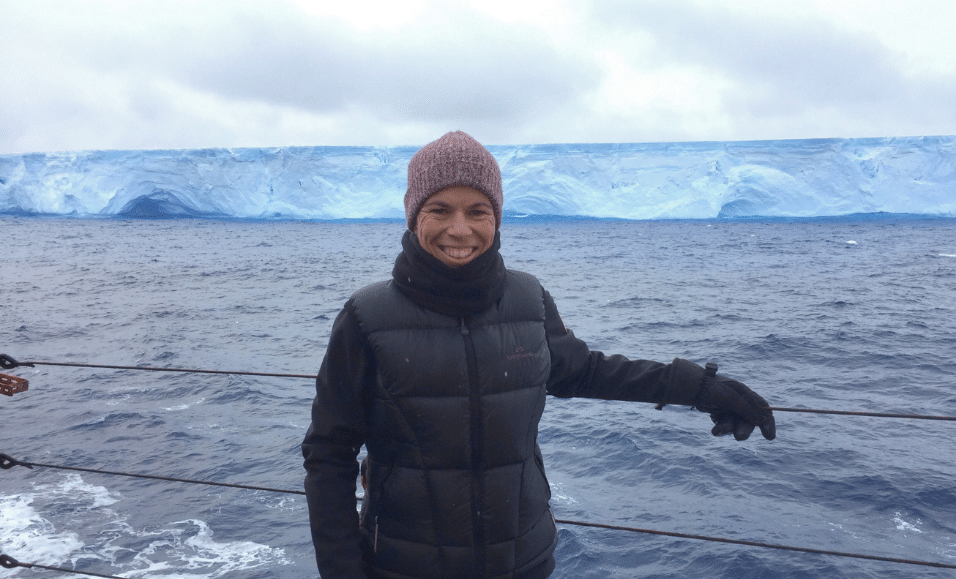Professor Jan Strugnell awarded SCAR Medal for Education and Communication

Professor Jan Strugnell during an expedition to Antarctica.

Professor Jan Strugnell and Dr Thomas Shafee at the Women in Antarctic Research Wikibomb event at the SCAR Open Science Conference in 2016.

Professor Jan Strugnell and Dr Sally Lau in the lab at James Cook University.
It was a desire to have more women in Antarctic research considered for keynotes, high-profile roles and collaborators that prompted Professor Jan Strugnell to contemplate ways she could help raise the profile of women in Antarctic research.
After seeing a news story on the Women in Science Wikibomb run by the Australian Academy of Science in 2014, she realised this could be an impactful solution.
“A wikibomb seemed like a good way to do this, to engage the SCAR community, make something lasting and useful, and also to have a celebration of Antarctic women’s achievements,” Professor Strugnell says.
The Women in Antarctic Research Wikibomb initiated by Professor Strugnell, saw her lead a team of over 100 international volunteers to contribute over 100 original biographies of women in Antarctic research to Wikipedia.
The project was launched at a Wikibomb event during the SCAR Open Science conference in Kuala Lumper in 2016. Since then, it has made the contributions and successes of women in Antarctic research vastly more visible and widely available and has paved the way to better diversity, equity and inclusion within the international polar community. The project has also helped to amend the gender bias prevalent throughout Wikipedia.
Now, Professor Strugnell has been acknowledged for her efforts by being awarded the SCAR Medal for Education and Communication. This medal is one of three awarded annually by SCAR to recognise outstanding research and service to the international Antarctic community.
Professor Strugnell said that she is very honoured to receive the medal and that it wouldn’t have been possible without everyone who was involved in the project.
“This includes the support of SCAR, our Wikibomb committee, the SCAR national committees, delegates and the SCAR community for nominating women, and especially the volunteers who researched for and compiled information about the women profiled,” she says.
“The fact that the pages have been viewed over 1.2 million times and may have been translated into other languages is amazing.”
Following the completion of her Honours at James Cook University, Professor Strugnell was awarded a Rhodes Scholarship to study at Oxford University. Here, she completed her PhD in the molecular evolutionary history of cephalopoda (the class that includes octopus, squid and cuttlefish). She went on to study at Queen’s University in Belfast, the British Antarctic Survey, and the University of Cambridge before moving back to Australia to La Trobe University, where she rose to the rank of professor. Between 2016 and 2024, she was the Director of the Centre for Sustainable Tropical Fisheries and Aquaculture at James Cook University and is currently one of SAEF’s Theme Two (Biodiversity Status and Trends) leaders and a Chief Investigator.
In addition, she is currently a finalist for the Eureka Award for Excellence in Interdisciplinary Research as part of the team of molecular biologists and geologists. In research published in Science, the team used octopus DNA to discover that the West Antarctic Ice Sheet likely collapsed during the Last Interglacial around 125,000 years ago – when global temperatures were similar to today.
As an evolutionary molecular biologist, Professor Strugnell’s research investigates the evolution and function of marine organisms using genomic and proteomic (the study of proteins expressed by a genome) techniques. As part of her work with SAEF, Professor Strugnell is interested in interdisciplinary science and how she and her team can employ powerful genetic techniques to understand more about life in Antarctica today and the physical processes that have shaped its evolution. She is currently preparing for the Denman Marine Voyage, a multidisciplinary marine science campaign on board the RSV Nuyina in February 2025, which will help progress this research.
View the List of Antarctic women, including Professor Jan Strugnell.